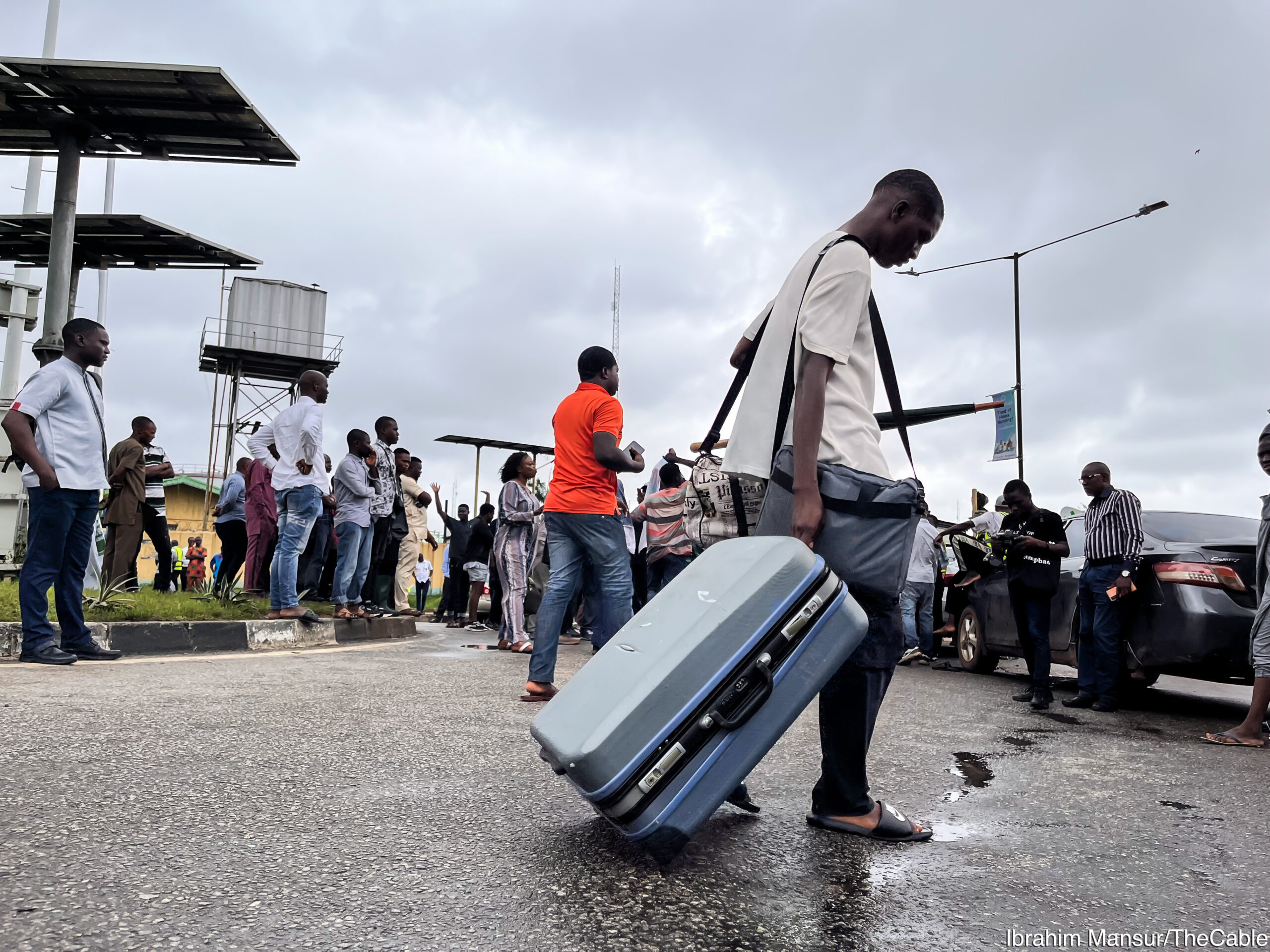‘MAYOWA TIJANI, TheCable’s editor-at-large, speaks exclusively with Jérémie Zoungrana, the Nigeria country director of the Bill and Melinda Gates Foundation (BMGF), on issues around vaccines and immunisation in commemoration of World Immunisation Week 2023. Zoungrana tells TheCable why it has taken this long to develop a malaria vaccine, explains the need for the uptake of vaccines against Diphtheria, and what our world will be without these life-saving jabs.
TheCable: In the past 30 years, the world has made a lot of progress in immunization, especially across the global south. A lot of that progress can be credited to the Gates Foundation. But the setback of 2020 was defining. How much recovery have we made since 2020?
Jeremie Zoungrana: The COVID-19 pandemic was a major setback to the global immunization program because most of the gains of the last decade were lost. According to the WHO (2020) around 7.7 million children in Africa missed out on their routine immunization vaccines – Diphtheria-Tetanus-Pertussis, Measles, and Polio vaccines in 2020.
Globally an additional 3.7 million more children also missed out on routine immunization than in 2019. A report by AFRO suggests that the region recorded reductions in percentage coverage across the board between 2019 and 2020. Coverage for the DTP-1 vaccine fell by a percentage point to 79% in 2020, for DTP-3 (Diphtheria-Tetanus-Pertussis) (Diphtheria-Tetanus-Pertussis) from 74% to 72%, and for MCV1 from 70% to 68%. Globally, DTP-1 coverage fell from 90% to 87% between 2019 and 2020, from 86% to 83% for DTP-3, and 86% to 84% for MCV1.
Advertisement
We also experienced outbreaks of vaccine-preventable diseases driven by this reversal in coverage and delayed conduct of measles SIAs (supplementary immunization activities). Over 420 cases were reported by week 13 in 2020. Due to the COVID pandemic, 13 states in Nigeria that were at risk of outbreak could not conduct their measles campaigns, leading to delays until 2022/2023.
It is however gladdening that most countries are investing in efforts to address this situation. In Nigeria, we saw immunization (Penta3) coverage rising to 57% in 2022 for the first time in 10 years. These and other gains recorded are a result of coordinated multi-partner collaboration at global, national, and sub-national levels.
TheCable: Every year in Nigeria, we report deaths as a result of Cholera, which was defeated in the UK and the US over 200 years ago. Can Cholera vaccination change this recurring decimal?
Advertisement
Jeremie Zoungrana: Cholera vaccination can help reduce the occurrence of cholera in Africa, as it provides protection against the bacterium that causes the disease. Cholera is endemic in many parts of Africa, and outbreaks of the disease are common, particularly in areas with poor sanitation and limited access to clean water.
Vaccination is one of the most cost-effective ways to prevent and control cholera outbreaks, along with improving water and sanitation infrastructure, and promoting good hygiene practices. The World Health Organization (WHO) recommends the use of oral cholera vaccines as a key component of cholera control and prevention strategies in endemic areas.
Several organizations, including the WHO and the Global Task Force on Cholera Control, are working to improve access to cholera vaccines in Africa, particularly in areas that are at high risk for cholera outbreaks. By increasing vaccination coverage, it is possible to reduce the incidence of cholera and prevent the spread of the disease in Africa.
TheCable: The world saw how mRNA vaccines were developed at an unprecedented speed in 2020 and began questioning why malaria vaccines were not developed at the same pace despite how many people malaria kills in the global south annually. Is there a reason why malaria vaccines are taking forever?
Advertisement
Jeremie Zoungrana: An mRNA (messenger RNA) vaccine is a type of vaccine that uses a small piece of genetic material from the virus or pathogen that causes a disease. Unlike traditional vaccines, which use weakened or inactivated forms of the virus or pathogen, mRNA vaccines work by instructing cells in the body to produce a harmless piece of the virus or pathogen.
When a person receives an mRNA vaccine, the vaccine delivers a small piece of mRNA into the cells of the body. This mRNA contains the genetic code for a harmless piece of the virus or pathogen, such as the spike protein on the surface of the SARS-CoV-2 virus that causes COVID-19. The cells in the body use this mRNA to produce the spike protein, which then triggers an immune response.
The immune system recognizes the spike protein as foreign and produces antibodies to attack it. If the person is later exposed to the actual virus, their immune system will recognize the spike protein and be able to mount a rapid response to neutralize the virus and prevent the person from developing COVID-19 or other diseases caused by the virus or pathogen.
The mRNA vaccines currently authorized for emergency use against COVID-19 are the Pfizer-BioNTech vaccine and the Moderna vaccine. These vaccines have shown to be highly effective at preventing COVID-19 infections and are a promising innovative approach to vaccine development.
Advertisement
Developing a vaccine for malaria has been challenging for several reasons:
Complexity of the malaria parasite: The malaria parasite is a complex organism with multiple stages of development and antigenic variation, making it difficult to identify a single target for vaccine development.
Advertisement
High genetic diversity of the parasite: The genetic diversity of the malaria parasite is high, which means that there are many different strains of the parasite that can cause malaria. This makes it challenging to develop a vaccine that provides broad protection against all strains of the parasite.
Limited funding for research and development: Malaria disproportionately affects people living in low- and middle-income countries, where resources for research and development are often limited.
Advertisement
Limited commercial incentives: Unlike other diseases, such as COVID-19, there is limited commercial incentive for pharmaceutical companies to invest in developing a malaria vaccine, as the market for the vaccine would primarily be in low- and middle-income countries.
Despite these challenges, there has been progress in malaria vaccine research, and several candidate vaccines are currently in clinical trials. The RTS vaccine, which provides partial protection against malaria in children, was approved for use in several African countries in 2019. However, more research and development is needed to develop a highly effective malaria vaccine that can be used on a large scale to prevent malaria infections and deaths.
Advertisement
TheCable: Still on the global south, Africa produces about 1% of vaccines it consumes. Our analysis shows that this may not change anytime soon. How do we encourage local immunisation when local vaccine production is failing?
Jeremie Zoungrana: Vaccine manufacturing requires substantial investments in R&D (Research & Development) (Research & Development), infrastructure, regulatory processes, and market shaping. Global partners are working with select countries including Nigeria to help shape the future of local vaccine manufacturing. Given the frameworks and stringent regulations required, this may take a while to become functional.
TheCable: Nearly 100 people have died from the Diphtheria Outbreak in Nigeria. This is a problem effective immunization can solve. But it has not. What do you think the Nigerian government can do better to deal with this preventable outbreak?
Jeremie Zoungrana: Diphtheria is a vaccine-preventable disease, and the most effective way to prevent a diphtheria outbreak in Nigeria is through widespread vaccination. Nigeria recorded 724 cases with 89 deaths. The vaccines are available in all primary health care centers, yet uptake is still very low and even this is inequitably distributed. Some states have extremely low Penta3 coverage – the vaccine that could prevent Diphtheria. Some, as low as 10% when the system requires 90% subnational and average 80% national coverage to prevent this from happening. Luckily, the government has ramped up efforts, and we have since responded to the outbreak which has significantly slowed down.
The diphtheria vaccine is typically administered as part of the routine childhood immunization schedule, and it is important to ensure that all children receive the recommended doses of the vaccine.
In addition to vaccination, other measures that can help prevent a diphtheria outbreak in Nigeria include:
- Strengthening disease surveillance systems to detect and respond to cases of diphtheria promptly.
- Improving hygiene practices, such as frequent hand washing, to prevent the spread of the bacteria that causes diphtheria.
- Increasing public awareness of the signs and symptoms of diphtheria and promoting early treatment for individuals who develop the disease.
- Ensuring that healthcare workers are trained in the diagnosis and treatment of diphtheria, and that appropriate medical supplies and equipment are available to manage cases of the disease.
- Conducting outbreak investigations to identify the source of the outbreak and to implement targeted control measures.
It is also important to address underlying social and economic factors that can contribute to the spread of infectious diseases, such as poverty, overcrowding, and poor access to healthcare. By addressing these underlying factors, it may be possible to reduce the risk of a diphtheria outbreak and other infectious diseases in Nigeria.
TheCable: Lastly, can you tell us what the world, especially Nigeria, will look like without immunization, as we have it today?
Jeremie Zoungrana: Without vaccines we will start to see several outbreaks of childhood killer disease with their attendant consequence on morbidity and mortality. We will see rising devastating effects on household finances. This will also likely affect adults, something that has not been seen for a very long time as we saw in the Diphtheria outbreaks.
The world can do better with more vaccines as this is the safest, most cost-effective public health intervention available.
Without immunization, the world would look very different today. Many of the infectious diseases that are now preventable through vaccination would still be widespread and cause significant illness, disability, and death.
For example, before the introduction of the measles vaccine in the 1960s, measles was a common childhood disease that caused millions of cases and thousands of deaths each year. Similarly, polio, a disease that can cause permanent paralysis, was once a major public health threat, but is now close to being eradicated thanks to widespread vaccination efforts.
In addition to the human toll of infectious diseases, there would be significant economic costs associated with a world without immunization. Outbreaks of vaccine-preventable diseases can lead to school closures, lost productivity, and increased healthcare costs, all of which can have a negative impact on national and global economies.
Furthermore, without the protection provided by vaccines, individuals with weakened immune systems, such as young children, the elderly, and people with certain medical conditions, would be at a higher risk of severe illness and complications from infectious diseases.
In short, a world without immunization would be a much more dangerous and challenging place, with higher rates of illness, disability, and death, and significant economic and social costs.
Add a comment







